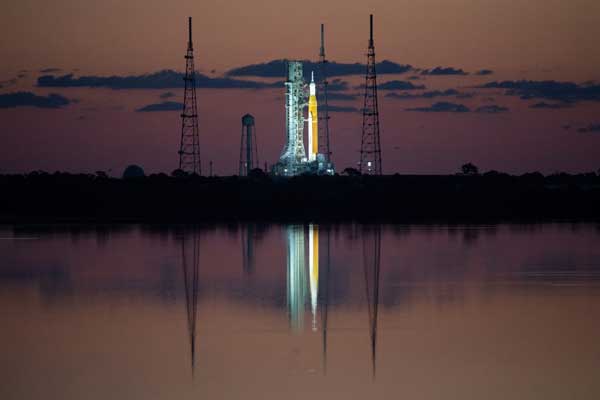
KENNEDY SPACE CENTER, Fla. (NASA PR) — Teams at NASA’s Kennedy Space Center in Florida continue to work on the main tasks needed to prepare the Space Launch System (SLS) rocket and Orion spacecraft to return to launch pad 39B for the next wet dress rehearsal attempt.
After re-tightening the flange bolts on the tail service mast umbilical lines to address a hydrogen leak identified during the previous wet dress rehearsal, engineers determined the seals on the bolts are no longer relaxing, and the system should remain tightly sealed during propellant loading. As a precaution, teams also moved the location of a heavy cantilevered filter on the tail service mast umbilical, which filters out any contaminants in the gaseous helium – a purge gas – that travels through the drain assist purge line. Engineers did not identify any leaks at its previous location, but relocating the filter will ensure it does not contribute to future leaks. Engineers conducted additional leak checks and have not detected any leaks at ambient air temperature.
Additionally, after replacing the helium check valve on the interim cryogenic propulsion stage (ICPS), engineers found a damaged rubber O-ring seal in the flight side of the quick disconnect – the area that separates the ICPS from the mobile launcher during launch. The O-ring came loose and entered the valve, preventing the valve from sealing correctly. Teams removed the flight and ground side of the quick disconnect system and replaced support hardware that was downstream of the check valve. Work is underway to determine the root cause to prevent any recurrences. Next, teams will re-pressurize the system and test the replaced hardware on the upper stage.
The supplier for gaseous nitrogen completed upgrades to its facility to meet the requirements for the next wet dress rehearsal attempt. Engineers will test the system next week to ensure it’s ready to support tanking operations. During wet dress rehearsal and launch, teams pump gaseous nitrogen into dry structures to protect avionics during propellant loading.
Teams also completed additional work needed, such as inspecting the Orion spacecraft for water damage that may have occurred during a heavy thunderstorm at the spaceport during the initial wet dress rehearsal attempt. Teams determined there was no damage to the systems inside the capsule and continue with inspections and wrapping up other work before retracting the platforms inside the Vehicle Assembly Building (VAB) to prepare to roll SLS and Orion back to the launch pad. NASA will announce dates for rolling out to the pad and the next wet dress rehearsal attempt once work inside the VAB and testing of the nitrogen system are nearing completion.

